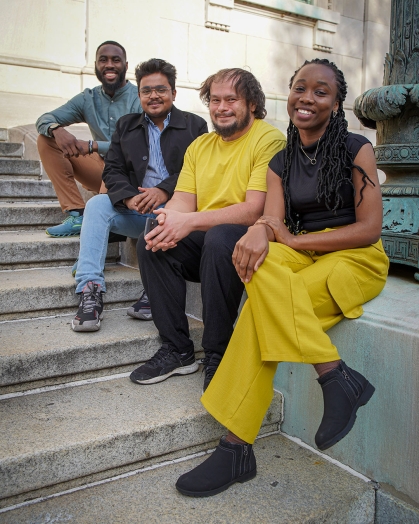Rutgers–Camden's Urban Innovation Fund Fuels Transformative Community Projects

Since 2022, the Urban Innovation Fund, a collaboration among university researchers and community organizations, has committed $400,000 to projects that directly benefit the areas Camden serves. One such project is working to ensure Camden residents can experience improved health outcomes by making sure their health data is comprehensive and accessible.
The Camden Health Equity Data Visualization Initiative seeks to address gaps in Camden’s health data with a detailed and timely web-based platform. Currently, Camden relies on national reports for its health care data; one established platform for the city has not been updated since 2017. Through the Urban Innovation Fund grant, the researchers involved in the initiative are designing a tool that will visualize health data across the city, focusing on social determinants such as income, education, housing, and environment.
“We want to make this platform accessible and actionable, which will empower stakeholders like policymakers, health care providers, and the general public to address health inequities with a well-informed approach over time,” said Ojobo Agbo Eje, a student in the data science master’s program and principal investigator of the project.
“The platform will provide real-time health data with maps, visualizations, and analysis, telling that story, and it will help people who are not so technically inclined to also see and understand the information,” Eje added.

The interdisciplinary team behind the initiative also includes graduate student Athang Sanjeev Bhandarkar, who studied with Adam Okulicz-Kozaryn, assistant professor in the Department of Public Policy and Administration, and sought the professor’s guidance on this project. Morenike Alugo, a graduate student in the prevention science program, reviews existing research on Camden’s community health and is preparing a comprehensive report on the group’s work, which is one of the fund’s grant requirements.
When seeking a community organization they could partner with on the project, the researchers selected the nonprofit Camden Coalition of Health Providers.
“Their mission aligns more to what we are trying to do,” Eje said. “Camden Coalition has a deep connection with the community, and we felt that that would bring essential insights that will help validate the work we're doing.”
The team was selected to present its preliminary analysis and findings at the Urban Affairs Association conference in Vancouver, Canada early next year. The group’s short-term goal is to make the platform fully operational by May 2025. In the long term, they hope to raise external funds to serve other communities beyond Camden, broadening the platform’s scale and impact.
Eje emphasized their project would not have gotten off the ground without the Rutgers–Camden’s support.
“The Urban Innovation Fund has been essential to our success because it has provided the financial resources needed for data analysis, platform creation, and community engagement activities,” Eje said.
The group’s collaboration with the Camden Coalition has been a case study in how the Urban Innovation Fund works for future grant recipients.
“The fund is dedicated to ensuring that our faculty members, students, and community leaders are working together on programs that have a scholarly impact and will benefit the city of Camden,” said Daniel Fidalgo Tomé, director of community engagement. “This is scholarly work that's going to be applicable and useful, and it serves as a learning experience for students as they pursue the kinds of research and work they want to do in the future.”


